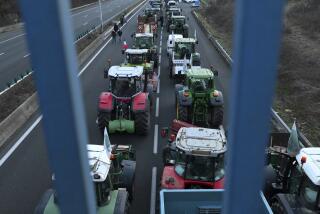U.S. Firms in France Try Counterattack : Protests: Coca-Cola and McDonald’s ads stress roles as huge consumers of French farm products.
PARIS — Militant French farmers, opposed to a U.S.-European agricultural trade agreement, have targeted Coca-Cola, McDonald’s and other high-profile American companies in France as sites for their sometimes violent demonstrations.
But in recent days, the besieged companies have counterattacked with an aggressive publicity campaign de-emphasizing their American roots and stressing their roles as huge consumers of French agricultural products.
“We appreciate the quality of French products,” announced a McDonald’s newspaper advertising campaign that began Thursday in 70 national and regional publications.
The McDonald’s ad states that the company buys potatoes from growers in three geographic regions of France; meat from nine regions, and salad from one region. That means that, in total, the company purchases products from 13 of 22 regions in France. Nothing in a McDonald’s hamburger sold in France comes from the United States, not even the ketchup, company spokeswoman Marie-Pierre LaHay stressed Thursday.
Similarly, Coca-Cola in France distributed a fact sheet to farmers describing the company as one of the biggest purchasers of sugar beets in France, accounting for the production of more than 100,000 tons of sugar. “Coca-Cola today is a 100% French product,” spokesman Cyriac de Salaberry said in an interview with Le Monde newspaper.
The quick riposte by the American companies demonstrated a growing sophistication in defusing a highly charged political climate in which internationally known brand names provide convenient targets.
Forty years ago, grape growers in Bordeaux went on a rampage, overturning Coca-Cola trucks in protest against the introduction of what they called this new “American wine.” The Coca-Cola War, as it was known at the time, went on for weeks before fizzling out.
The series of anti-American protests by farmers in France began this summer when several hundred farmers, enraged by U.S. pressure to reduce European Community farm subsidies, blocked the entrance to the Euro Disneyland theme park 20 miles east of Paris. The farmers’ action prevented several thousand potential visitors, mostly from other European countries, from reaching the park.
Anti-American protests picked up again last week after American and EC representatives negotiated a settlement in a key dispute over subsidies the community pays to oilseed farmers on the Continent. American farmers contend the subsidies cost them $1 billion a year in lost trade. But farmers in France, the country most affected by the subsidy issue, contend the measures will be the ruin of the French countryside.
Farmers’ demonstrations have been staged outside more than a dozen McDonald’s restaurants across the country. In Lille, farmers blocked the entrance and set fire to bales of hay in front of one restaurant franchise. Most of the demonstrations, however, were nonviolent.
Another group of farmers seized control of the French Coca-Cola factory outside Paris for several hours, spray-painting anti-American slogans on the buildings.
Fearing an escalation of guerrilla actions against their facilities in France, McDonalds and Coca-Cola responded this week with their independent but similar publicity campaigns.
McDonald’s, which operates 236 restaurants in France, announced that it spends $140 million annually on French food products, providing employment for an estimated 3,000 farmers. “In France,” said LaHay, “the only thing American at McDonald’s is the name. Of our 18,000 employees, only three are Americans.”
Coca-Cola spokesman De Salaberry said the company, with a huge bottling plant in Dunkirk and smaller plants in seven other sites, is responsible for 2,000 jobs and 6,000 indirect jobs in the French economy. France is an important base for exporting Coca-Cola products to other countries, especially in Eastern Europe.
* RELATED STORY: D2
More to Read
Sign up for Essential California
The most important California stories and recommendations in your inbox every morning.
You may occasionally receive promotional content from the Los Angeles Times.










